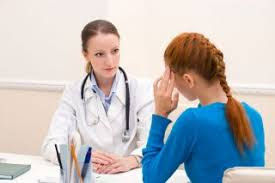surveyed more than 2,500 men and nearly 3,700 women.
HPV infection is easily prevented through vaccination, but "the lack of
knowledge may have contributed to low HPV vaccination rates in the United
States," Ashish Deshmukh, an assistant professor at the University of Texas
Health School of Public Health in Houston, said in a university news release.
More outreach by doctors is needed, his team noted. Looking over the survey
data, the researchers found that among people eligible for the vaccine, only 19%
of men and 31.5% of women had been advised by their doctor to get vaccinated.
The U.S. Centers for Disease Control and Prevention recommends that boys and
girls ages 9 to 14 get two doses of the HPV vaccine. That age group is preferred
because it's best to immunize against sexually transmitted HPV before the onset
of sexual activity. Three doses are typically needed if the first dose was given at
age 15.
The CDC also now recommends that adults 27 to 45 consult with their doctor as
to whether they should be vaccinated.
Because HPV-linked cancers can also affect males, it's important that boys get
vaccinated, too.
"HPV vaccination campaigns have focused heavily on cervical cancer
prevention
in women, [but] our findings demonstrate a need to educate both sexes regarding
HPV and HPV vaccination," Deshmukh said.
"Rates of cervical cancer have declined in the last 15 to 20 years because of
screening," he continued, but "on the other hand, there was a greater than 200%
increase in oropharyngeal cancer rates in men and a nearly 150% rise in anal
cancer rates in women."
Increasing HPV vaccination rates is essential to bring down the growing rates of
these cancers, Deshmukh said.
Two experts agreed that more must be done to educate Americans about HPV.
"Previous research has shown that most parents who don't allow their children to
get HPV vaccination do so due to lack of information," noted Dr. David Fagan,
vice chair of pediatrics at Cohen Children's Medical Center in New Hyde Park,
N.Y.
"The message from providers can be as simple as: 'I strongly believe in the
importance of this cancer-preventing vaccine for [your child],'" he said. "I find it
effective to emphasize the parents' role in preventing their child from getting
HPV-related cancers."
Dr. Jill Rabin helps direct education and development for obstetrics and gynecology at Northwell Health, also in New Hyde Park. She said that, given the importance of HPV as a cause of cervical cancer, it's not surprising that awareness is much higher for women versus men.
"Women also tend to be the linchpin of their families and through this avenue,
spouses, partners and children are brought into the medical fold," Rabin said.
"Nevertheless, it is time for men and women to realize that the time is now and
we have a real opportunity to stop these cancers in their tracks."
Rabin added that "trying to convince patients that viruses are actually not
curable
but that the vaccine may prevent these cancers is a fairly daunting task." So,
doctors and other health care professionals should "do everything we can to help
educate our patients and make them part of the dialogue" around HPV and the
vaccine.
SOURCES: David Fagan, M.D., vice chair, pediatrics, Cohen Children's
Medical
Center, New Hyde Park, N.Y.; Jill Rabin, M.D., vice chair, education and
development, obstetrics and gynecology, Northwell Health, New Hyde Park,
N.Y.; University of Texas Health Science Center, news release, Sept. 16, 2019









0 Comments